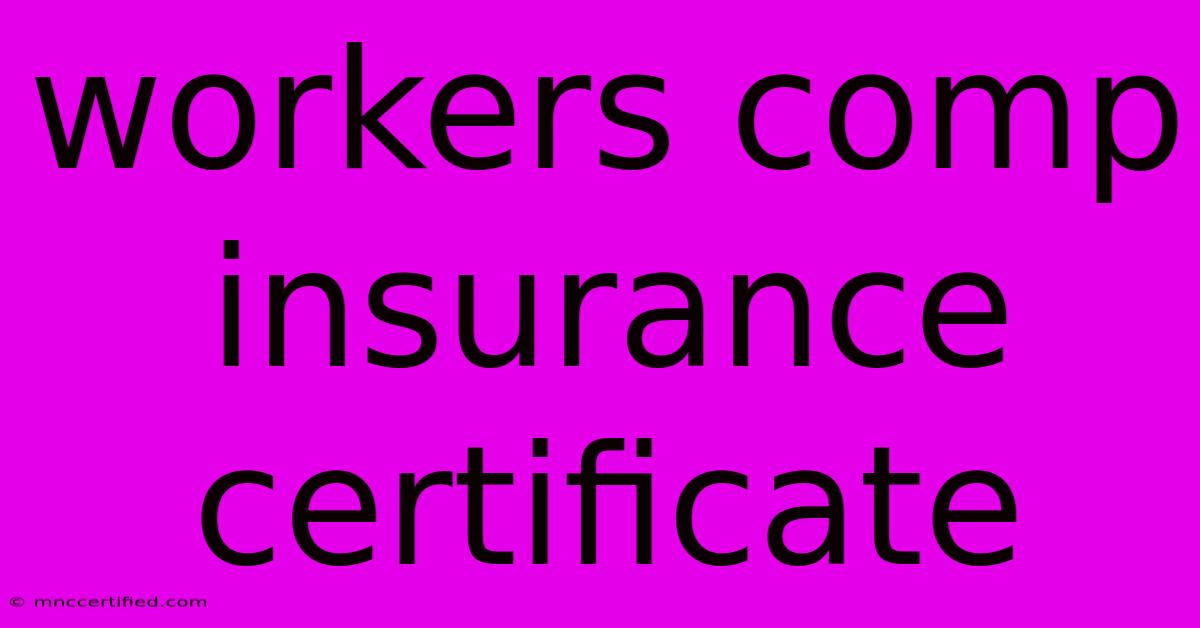Workers Comp Insurance Certificate

Table of Contents
Workers' Comp Insurance Certificate: Your Guide to Understanding and Obtaining One
A Workers' Compensation Insurance Certificate, often called a Certificate of Insurance (COI) for Workers' Compensation, is a crucial document proving a company carries the necessary insurance to cover employees injured on the job. It's more than just a piece of paper; it's a vital legal and financial safeguard for both employers and clients. This comprehensive guide explains everything you need to know about obtaining and understanding a workers' comp insurance certificate.
What is a Workers' Compensation Insurance Certificate?
A Workers' Comp Certificate of Insurance is an official document issued by an insurance company confirming a business has active workers' compensation insurance coverage. It provides key details about the policy, including:
- Policyholder's Name and Address: Clearly identifies the insured business.
- Policy Number: A unique identifier for the specific insurance policy.
- Insurance Company Name and Contact Information: Allows for verification of the policy's validity.
- Effective and Expiration Dates: Specifies the period of coverage.
- Coverage Limits: Indicates the maximum amount the insurer will pay for covered claims.
- Description of Covered Work: Often outlines the type of work covered under the policy.
This certificate acts as proof of insurance, often required by clients, contractors, or other businesses before starting work. Failure to provide a valid certificate can lead to significant legal and financial repercussions.
Why is a Workers' Compensation Certificate Important?
The importance of a workers' comp certificate extends to several key areas:
- Legal Compliance: Most states require employers to carry workers' compensation insurance. A certificate demonstrates compliance with these laws, avoiding penalties and legal issues.
- Client Requirements: Many clients, especially larger organizations, mandate that subcontractors and vendors provide proof of workers' compensation insurance before awarding contracts. This protects them from liability in case of employee injuries on their premises.
- Risk Mitigation: The certificate protects both the employer and the client from the financial burden of workplace injuries. Workers' compensation insurance covers medical expenses, lost wages, and other related costs.
- Building Trust and Credibility: Providing a valid certificate builds trust and demonstrates professionalism, assuring potential clients of your commitment to safety and legal compliance.
How to Obtain a Workers' Compensation Insurance Certificate
The process of obtaining a workers' comp COI is generally straightforward:
- Contact your Insurance Provider: Reach out to your workers' compensation insurance company.
- Request a Certificate: Inform them that you need a Certificate of Insurance for a specific client or project, providing the necessary details like the client's name and address.
- Provide Necessary Information: Your insurer may require additional information, such as the project address or a specific description of the work being performed.
- Review and Verify: Once you receive the certificate, carefully review it to ensure all the information is accurate and up-to-date.
- Submit to the Required Party: Provide the certificate to the client or entity that requested it.
Important Note: Certificates are typically valid only for a specific period. Always check the expiration date and request a new one when necessary.
Understanding the Information on the Certificate
It's crucial to understand the information presented on your workers' comp certificate. Pay close attention to:
- Policy Effective and Expiration Dates: Ensure your coverage is active throughout the duration of your project.
- Coverage Limits: This shows the maximum payout for covered injuries. Higher limits often mean greater protection.
- Additional Insured: Some certificates might list additional insured parties, which extends coverage to specific entities involved in your project.
If anything is unclear or seems incorrect, contact your insurance provider immediately for clarification.
Potential Consequences of Not Having a Workers' Compensation Certificate
Operating without proper workers' compensation insurance can lead to severe consequences:
- Heavy Fines: State regulations often impose substantial fines on businesses operating without insurance.
- Legal Liability: In the event of a workplace injury, you could face significant legal and financial liability for medical expenses and lost wages.
- Contractual Penalties: Clients might terminate contracts if you fail to provide a valid certificate.
- Reputational Damage: Lack of insurance can severely damage your business's reputation and credibility.
Ensuring you have a valid workers' comp insurance certificate is essential for protecting your business and complying with the law. Don't hesitate to contact your insurance provider with any questions or concerns. Proactive management of your workers' compensation insurance is key to a successful and compliant business operation.

Thank you for visiting our website wich cover about Workers Comp Insurance Certificate. We hope the information provided has been useful to you. Feel free to contact us if you have any questions or need further assistance. See you next time and dont miss to bookmark.
Featured Posts
-
Jutta Jake Paul Win Celebration Photos
Nov 17, 2024
-
Can I Have Double Dental Insurance
Nov 17, 2024
-
James River Insurance Company News
Nov 17, 2024
-
Blanket Additional Insured Meaning
Nov 17, 2024
-
Heisman Watch Travis Hunter Tracker
Nov 17, 2024